An Analysis of Corporate Social Responsibility at PepsiCo India
VerifiedAdded on 2019/09/20
|5
|1294
|386
Report
AI Summary
This report provides an in-depth analysis of PepsiCo India's Corporate Social Responsibility (CSR) initiatives. It begins with an overview of PepsiCo's mission, emphasizing its commitment to consumers, employees, business partners, and communities. The report details PepsiCo India's investment in the country, its extensive operations, and its focus on sustainability across environmental, human, and talent dimensions. Environmental sustainability efforts include resource replenishment and minimizing environmental impact, such as water conservation and waste management. Human sustainability focuses on providing nutritious products and addressing health issues through partnerships. Talent sustainability emphasizes building an empowered workforce and promoting diversity. The report then explores the CSR policies through the lens of ethical and organizational theories, referencing key scholars like Davis, Garriga, and Mele, and Mitchell, Agle, and Wood. The analysis highlights the importance of stakeholder involvement, ethical considerations, and the application of social contract theory to foster ethical business practices. The conclusion underscores the positive impact of these CSR practices on PepsiCo's image, transparency, and stakeholder relations.
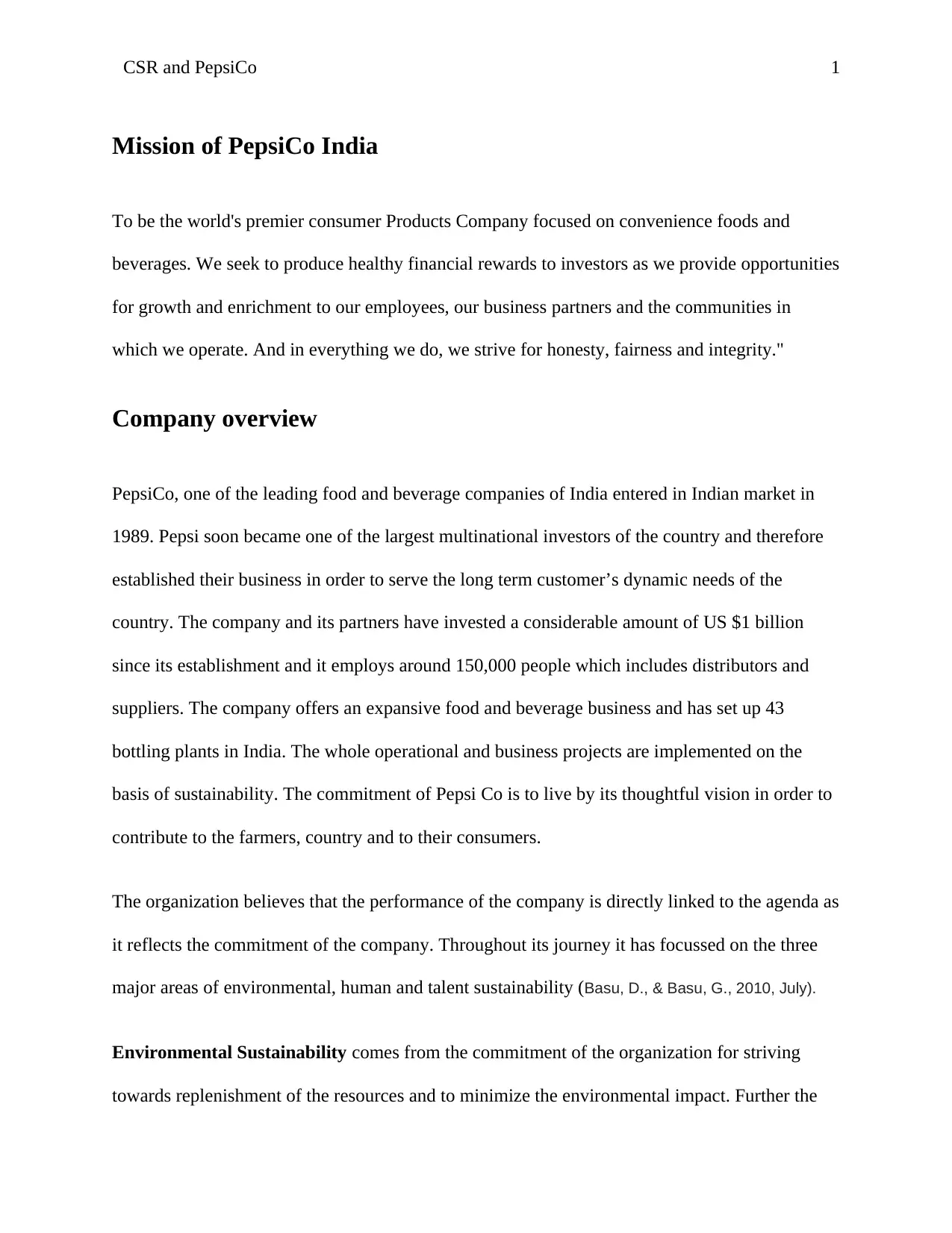
CSR and PepsiCo 1
Mission of PepsiCo India
To be the world's premier consumer Products Company focused on convenience foods and
beverages. We seek to produce healthy financial rewards to investors as we provide opportunities
for growth and enrichment to our employees, our business partners and the communities in
which we operate. And in everything we do, we strive for honesty, fairness and integrity."
Company overview
PepsiCo, one of the leading food and beverage companies of India entered in Indian market in
1989. Pepsi soon became one of the largest multinational investors of the country and therefore
established their business in order to serve the long term customer’s dynamic needs of the
country. The company and its partners have invested a considerable amount of US $1 billion
since its establishment and it employs around 150,000 people which includes distributors and
suppliers. The company offers an expansive food and beverage business and has set up 43
bottling plants in India. The whole operational and business projects are implemented on the
basis of sustainability. The commitment of Pepsi Co is to live by its thoughtful vision in order to
contribute to the farmers, country and to their consumers.
The organization believes that the performance of the company is directly linked to the agenda as
it reflects the commitment of the company. Throughout its journey it has focussed on the three
major areas of environmental, human and talent sustainability (Basu, D., & Basu, G., 2010, July).
Environmental Sustainability comes from the commitment of the organization for striving
towards replenishment of the resources and to minimize the environmental impact. Further the
Mission of PepsiCo India
To be the world's premier consumer Products Company focused on convenience foods and
beverages. We seek to produce healthy financial rewards to investors as we provide opportunities
for growth and enrichment to our employees, our business partners and the communities in
which we operate. And in everything we do, we strive for honesty, fairness and integrity."
Company overview
PepsiCo, one of the leading food and beverage companies of India entered in Indian market in
1989. Pepsi soon became one of the largest multinational investors of the country and therefore
established their business in order to serve the long term customer’s dynamic needs of the
country. The company and its partners have invested a considerable amount of US $1 billion
since its establishment and it employs around 150,000 people which includes distributors and
suppliers. The company offers an expansive food and beverage business and has set up 43
bottling plants in India. The whole operational and business projects are implemented on the
basis of sustainability. The commitment of Pepsi Co is to live by its thoughtful vision in order to
contribute to the farmers, country and to their consumers.
The organization believes that the performance of the company is directly linked to the agenda as
it reflects the commitment of the company. Throughout its journey it has focussed on the three
major areas of environmental, human and talent sustainability (Basu, D., & Basu, G., 2010, July).
Environmental Sustainability comes from the commitment of the organization for striving
towards replenishment of the resources and to minimize the environmental impact. Further the
Paraphrase This Document
Need a fresh take? Get an instant paraphrase of this document with our AI Paraphraser
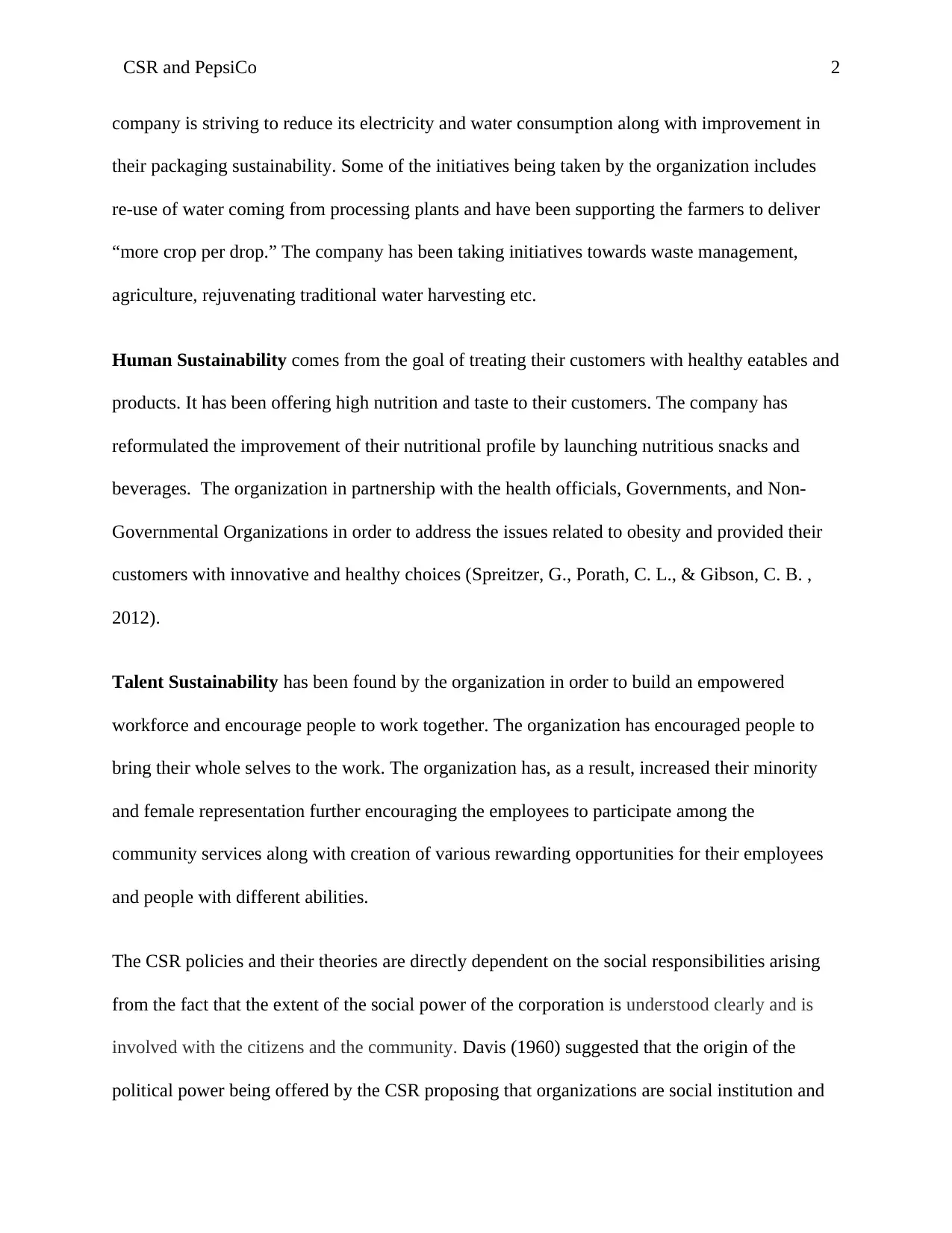
CSR and PepsiCo 2
company is striving to reduce its electricity and water consumption along with improvement in
their packaging sustainability. Some of the initiatives being taken by the organization includes
re-use of water coming from processing plants and have been supporting the farmers to deliver
“more crop per drop.” The company has been taking initiatives towards waste management,
agriculture, rejuvenating traditional water harvesting etc.
Human Sustainability comes from the goal of treating their customers with healthy eatables and
products. It has been offering high nutrition and taste to their customers. The company has
reformulated the improvement of their nutritional profile by launching nutritious snacks and
beverages. The organization in partnership with the health officials, Governments, and Non-
Governmental Organizations in order to address the issues related to obesity and provided their
customers with innovative and healthy choices (Spreitzer, G., Porath, C. L., & Gibson, C. B. ,
2012).
Talent Sustainability has been found by the organization in order to build an empowered
workforce and encourage people to work together. The organization has encouraged people to
bring their whole selves to the work. The organization has, as a result, increased their minority
and female representation further encouraging the employees to participate among the
community services along with creation of various rewarding opportunities for their employees
and people with different abilities.
The CSR policies and their theories are directly dependent on the social responsibilities arising
from the fact that the extent of the social power of the corporation is understood clearly and is
involved with the citizens and the community. Davis (1960) suggested that the origin of the
political power being offered by the CSR proposing that organizations are social institution and
company is striving to reduce its electricity and water consumption along with improvement in
their packaging sustainability. Some of the initiatives being taken by the organization includes
re-use of water coming from processing plants and have been supporting the farmers to deliver
“more crop per drop.” The company has been taking initiatives towards waste management,
agriculture, rejuvenating traditional water harvesting etc.
Human Sustainability comes from the goal of treating their customers with healthy eatables and
products. It has been offering high nutrition and taste to their customers. The company has
reformulated the improvement of their nutritional profile by launching nutritious snacks and
beverages. The organization in partnership with the health officials, Governments, and Non-
Governmental Organizations in order to address the issues related to obesity and provided their
customers with innovative and healthy choices (Spreitzer, G., Porath, C. L., & Gibson, C. B. ,
2012).
Talent Sustainability has been found by the organization in order to build an empowered
workforce and encourage people to work together. The organization has encouraged people to
bring their whole selves to the work. The organization has, as a result, increased their minority
and female representation further encouraging the employees to participate among the
community services along with creation of various rewarding opportunities for their employees
and people with different abilities.
The CSR policies and their theories are directly dependent on the social responsibilities arising
from the fact that the extent of the social power of the corporation is understood clearly and is
involved with the citizens and the community. Davis (1960) suggested that the origin of the
political power being offered by the CSR proposing that organizations are social institution and
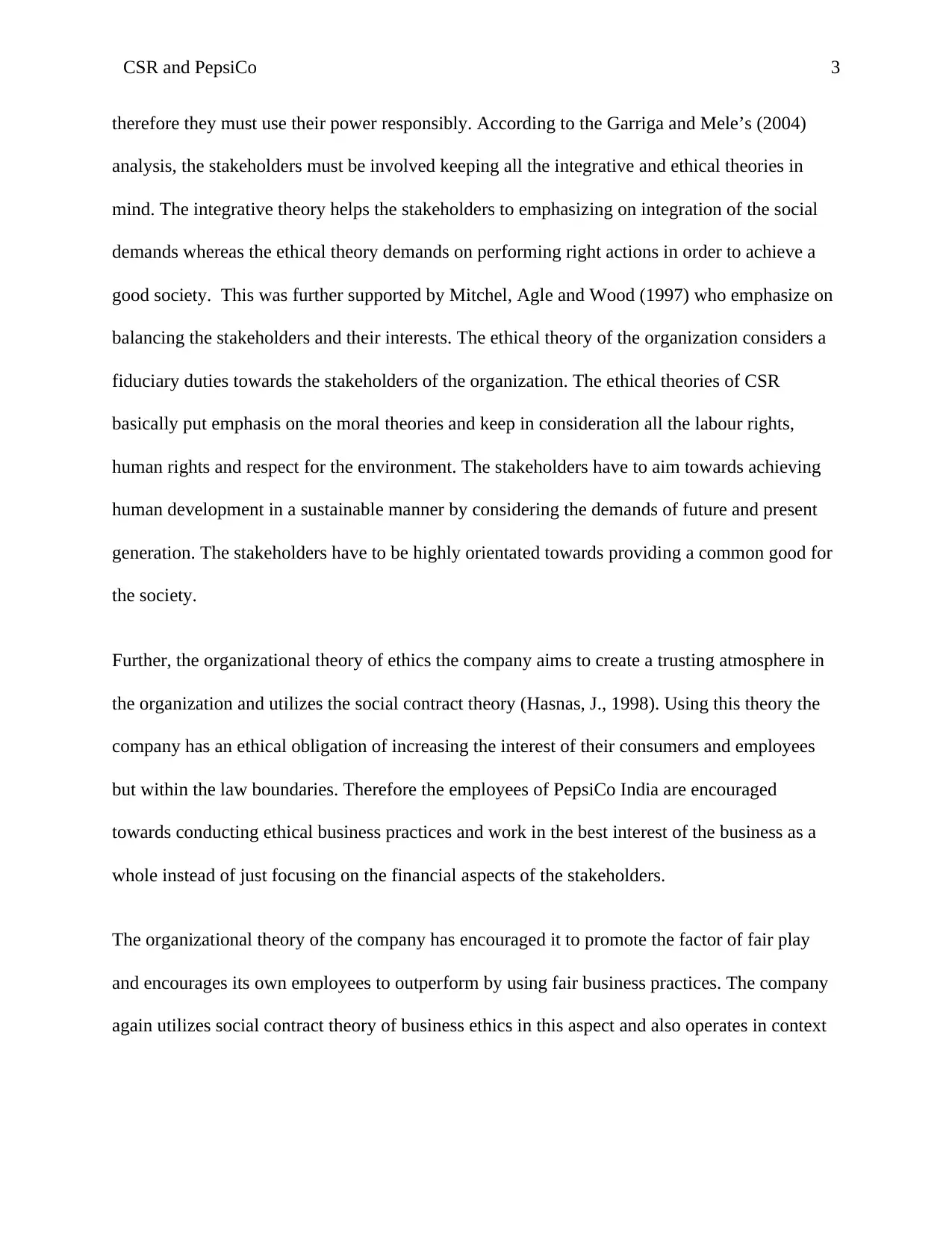
CSR and PepsiCo 3
therefore they must use their power responsibly. According to the Garriga and Mele’s (2004)
analysis, the stakeholders must be involved keeping all the integrative and ethical theories in
mind. The integrative theory helps the stakeholders to emphasizing on integration of the social
demands whereas the ethical theory demands on performing right actions in order to achieve a
good society. This was further supported by Mitchel, Agle and Wood (1997) who emphasize on
balancing the stakeholders and their interests. The ethical theory of the organization considers a
fiduciary duties towards the stakeholders of the organization. The ethical theories of CSR
basically put emphasis on the moral theories and keep in consideration all the labour rights,
human rights and respect for the environment. The stakeholders have to aim towards achieving
human development in a sustainable manner by considering the demands of future and present
generation. The stakeholders have to be highly orientated towards providing a common good for
the society.
Further, the organizational theory of ethics the company aims to create a trusting atmosphere in
the organization and utilizes the social contract theory (Hasnas, J., 1998). Using this theory the
company has an ethical obligation of increasing the interest of their consumers and employees
but within the law boundaries. Therefore the employees of PepsiCo India are encouraged
towards conducting ethical business practices and work in the best interest of the business as a
whole instead of just focusing on the financial aspects of the stakeholders.
The organizational theory of the company has encouraged it to promote the factor of fair play
and encourages its own employees to outperform by using fair business practices. The company
again utilizes social contract theory of business ethics in this aspect and also operates in context
therefore they must use their power responsibly. According to the Garriga and Mele’s (2004)
analysis, the stakeholders must be involved keeping all the integrative and ethical theories in
mind. The integrative theory helps the stakeholders to emphasizing on integration of the social
demands whereas the ethical theory demands on performing right actions in order to achieve a
good society. This was further supported by Mitchel, Agle and Wood (1997) who emphasize on
balancing the stakeholders and their interests. The ethical theory of the organization considers a
fiduciary duties towards the stakeholders of the organization. The ethical theories of CSR
basically put emphasis on the moral theories and keep in consideration all the labour rights,
human rights and respect for the environment. The stakeholders have to aim towards achieving
human development in a sustainable manner by considering the demands of future and present
generation. The stakeholders have to be highly orientated towards providing a common good for
the society.
Further, the organizational theory of ethics the company aims to create a trusting atmosphere in
the organization and utilizes the social contract theory (Hasnas, J., 1998). Using this theory the
company has an ethical obligation of increasing the interest of their consumers and employees
but within the law boundaries. Therefore the employees of PepsiCo India are encouraged
towards conducting ethical business practices and work in the best interest of the business as a
whole instead of just focusing on the financial aspects of the stakeholders.
The organizational theory of the company has encouraged it to promote the factor of fair play
and encourages its own employees to outperform by using fair business practices. The company
again utilizes social contract theory of business ethics in this aspect and also operates in context
⊘ This is a preview!⊘
Do you want full access?
Subscribe today to unlock all pages.

Trusted by 1+ million students worldwide
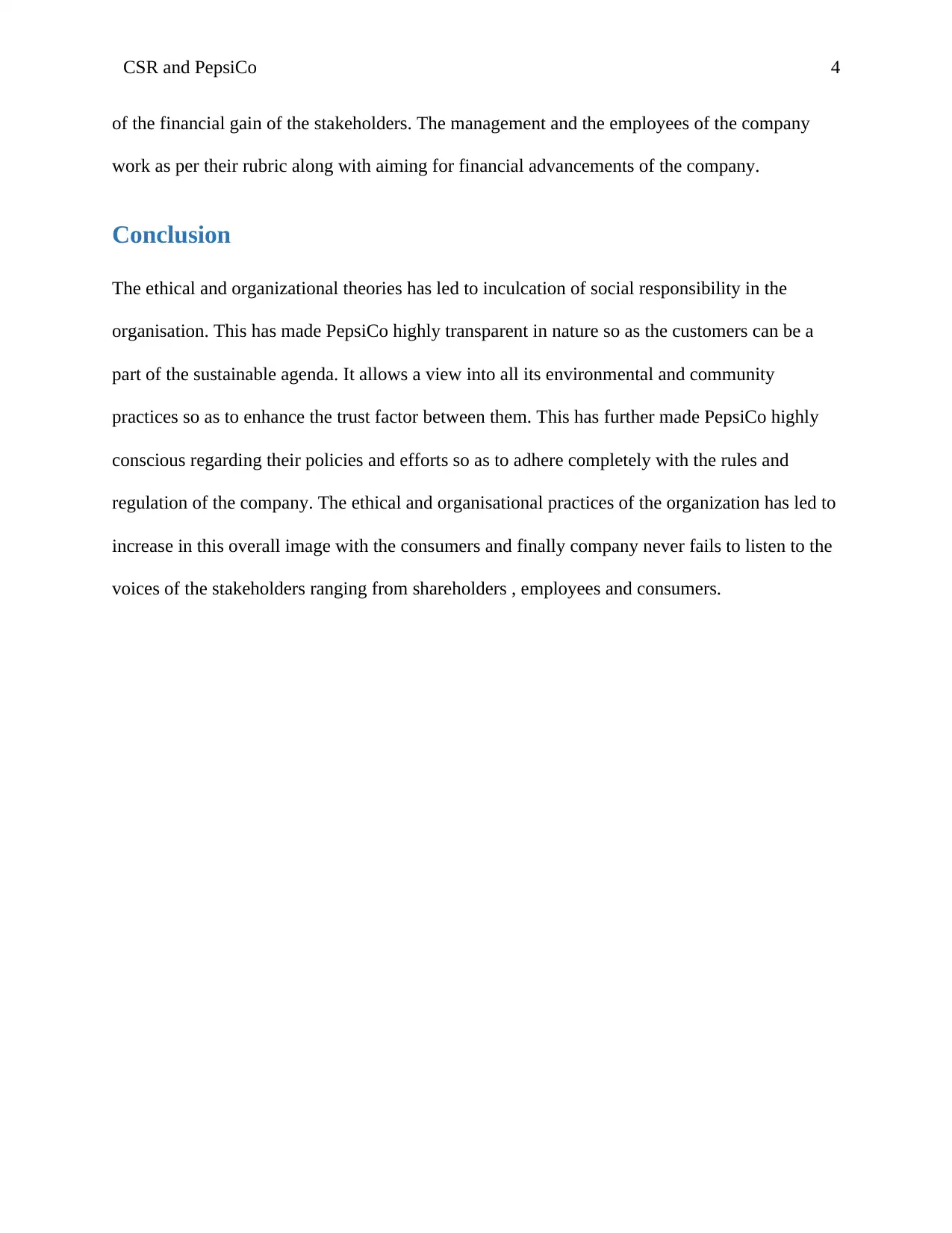
CSR and PepsiCo 4
of the financial gain of the stakeholders. The management and the employees of the company
work as per their rubric along with aiming for financial advancements of the company.
Conclusion
The ethical and organizational theories has led to inculcation of social responsibility in the
organisation. This has made PepsiCo highly transparent in nature so as the customers can be a
part of the sustainable agenda. It allows a view into all its environmental and community
practices so as to enhance the trust factor between them. This has further made PepsiCo highly
conscious regarding their policies and efforts so as to adhere completely with the rules and
regulation of the company. The ethical and organisational practices of the organization has led to
increase in this overall image with the consumers and finally company never fails to listen to the
voices of the stakeholders ranging from shareholders , employees and consumers.
of the financial gain of the stakeholders. The management and the employees of the company
work as per their rubric along with aiming for financial advancements of the company.
Conclusion
The ethical and organizational theories has led to inculcation of social responsibility in the
organisation. This has made PepsiCo highly transparent in nature so as the customers can be a
part of the sustainable agenda. It allows a view into all its environmental and community
practices so as to enhance the trust factor between them. This has further made PepsiCo highly
conscious regarding their policies and efforts so as to adhere completely with the rules and
regulation of the company. The ethical and organisational practices of the organization has led to
increase in this overall image with the consumers and finally company never fails to listen to the
voices of the stakeholders ranging from shareholders , employees and consumers.
Paraphrase This Document
Need a fresh take? Get an instant paraphrase of this document with our AI Paraphraser
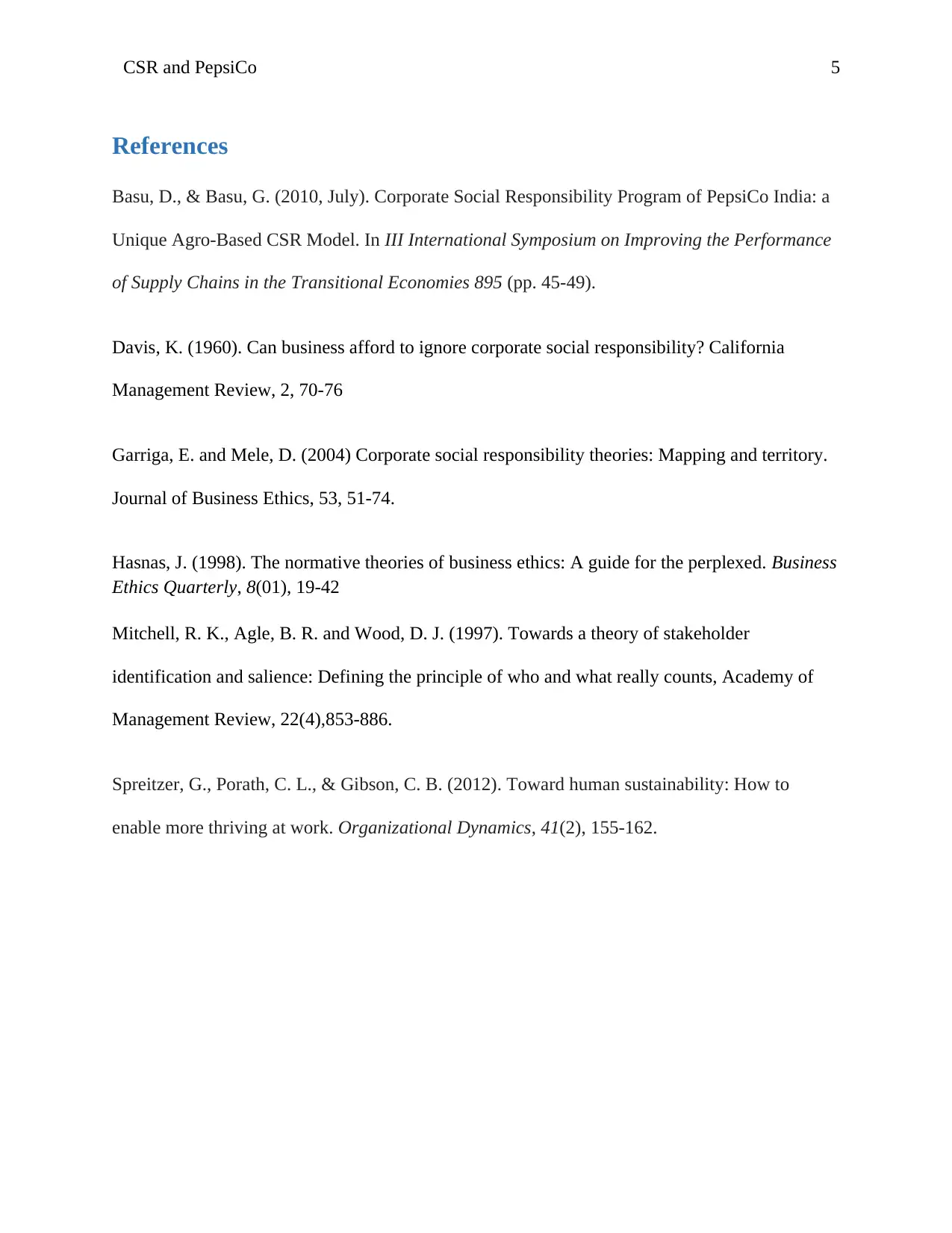
CSR and PepsiCo 5
References
Basu, D., & Basu, G. (2010, July). Corporate Social Responsibility Program of PepsiCo India: a
Unique Agro-Based CSR Model. In III International Symposium on Improving the Performance
of Supply Chains in the Transitional Economies 895 (pp. 45-49).
Davis, K. (1960). Can business afford to ignore corporate social responsibility? California
Management Review, 2, 70-76
Garriga, E. and Mele, D. (2004) Corporate social responsibility theories: Mapping and territory.
Journal of Business Ethics, 53, 51-74.
Hasnas, J. (1998). The normative theories of business ethics: A guide for the perplexed. Business
Ethics Quarterly, 8(01), 19-42
Mitchell, R. K., Agle, B. R. and Wood, D. J. (1997). Towards a theory of stakeholder
identification and salience: Defining the principle of who and what really counts, Academy of
Management Review, 22(4),853-886.
Spreitzer, G., Porath, C. L., & Gibson, C. B. (2012). Toward human sustainability: How to
enable more thriving at work. Organizational Dynamics, 41(2), 155-162.
References
Basu, D., & Basu, G. (2010, July). Corporate Social Responsibility Program of PepsiCo India: a
Unique Agro-Based CSR Model. In III International Symposium on Improving the Performance
of Supply Chains in the Transitional Economies 895 (pp. 45-49).
Davis, K. (1960). Can business afford to ignore corporate social responsibility? California
Management Review, 2, 70-76
Garriga, E. and Mele, D. (2004) Corporate social responsibility theories: Mapping and territory.
Journal of Business Ethics, 53, 51-74.
Hasnas, J. (1998). The normative theories of business ethics: A guide for the perplexed. Business
Ethics Quarterly, 8(01), 19-42
Mitchell, R. K., Agle, B. R. and Wood, D. J. (1997). Towards a theory of stakeholder
identification and salience: Defining the principle of who and what really counts, Academy of
Management Review, 22(4),853-886.
Spreitzer, G., Porath, C. L., & Gibson, C. B. (2012). Toward human sustainability: How to
enable more thriving at work. Organizational Dynamics, 41(2), 155-162.
1 out of 5
Related Documents
Your All-in-One AI-Powered Toolkit for Academic Success.
+13062052269
info@desklib.com
Available 24*7 on WhatsApp / Email
![[object Object]](/_next/static/media/star-bottom.7253800d.svg)
Unlock your academic potential
Copyright © 2020–2026 A2Z Services. All Rights Reserved. Developed and managed by ZUCOL.





